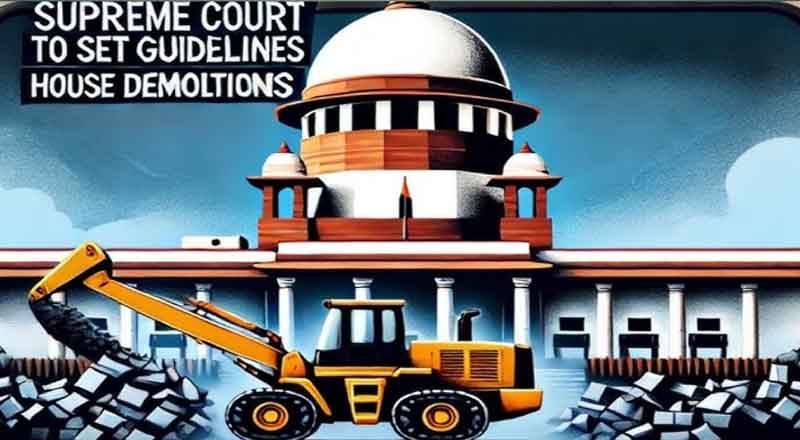Addressing Arbitrary Demolitions
The Supreme Court of India recently issued a significant judgment aiming to curb illegal demolitions of private properties carried out by state authorities, especially when tied to accusations of criminal conduct by the tenants or owners. Responding to petitions that included cases from Rajasthan, Madhya Pradesh, and Delhi, the Court’s guidelines seek to prevent demolitions based solely on allegations, reinforcing the fundamental rights to shelter and due process under Article 21 of the Indian Constitution. These protections highlight the presumption of innocence and underscore that even those accused of crimes are entitled to fair legal treatment, including the right to defend their property rights.
The Supreme Court’s Guidelines on Demolitions
The Supreme Court’s guidelines emphasize procedural fairness, including a mandatory 15-day notice period to allow tenants and owners adequate time to challenge demolition orders or manage their affairs. The notice must clearly state the reasons for the demolition, ensuring transparency and allowing the affected party a fair chance to contest the order. Additionally, the Court has warned that any violation of these guidelines could result in contempt proceedings against responsible officials. Furthermore, the Court has provisioned that in cases of wrongful demolition, officials may be held financially liable to compensate the affected party and cover property restitution costs.
These guidelines were established following petitions challenging recent demolitions in Rajasthan and Madhya Pradesh, where homes of individuals accused of inciting communal tensions were razed without adequate due process. The Supreme Court’s ruling is also connected to a 2022 plea by the Jamiat-Ulama-i-Hind against similar demolitions in Delhi’s Jahangirpuri area, where homes were destroyed amid communal tensions following a religious procession.
Rajasthan’s Demolition Laws and Recent Incidents
In Rajasthan, the laws regulating demolitions emphasize due process, yet recent incidents have raised concerns about whether these provisions are consistently upheld. Under Section 245 of the Rajasthan Municipalities Act, 2009, demolitions can be ordered for properties encroaching on public land, with penalties including fines and possible confiscation. However, a key requirement is that the accused be given a written notice detailing the grounds for demolition, as well as a reasonable opportunity to respond.
A recent case in Udaipur involved the demolition of a home following an alleged communal incident linked to the tenant’s son. Notices were issued just a night before the demolition, raising questions about the adequacy of the time provided for the tenant to respond, as mandated by law. Additionally, the Rajasthan Forest Act, 1953, specifies that only a Tehsildar can authorize eviction from forest land, yet this standard was reportedly bypassed, revealing gaps in the application of due process.
Madhya Pradesh: Expedited Demolitions and Legal Requirements
In Madhya Pradesh, the legal framework for demolitions is provided under Section 187 of the Madhya Pradesh Municipalities Act, 1961. This section allows for demolitions if a building was constructed without council approval, but only after the owner has been served with notice and fails to provide a satisfactory response. In June 2023, however, a home was demolished on the same day a criminal allegation was made against a family member, allegedly without issuing a prior notice. This instance demonstrates a troubling departure from the procedural fairness outlined in the Act, where even accused individuals retain the right to a formal notice period and the opportunity to defend their property.
Demolition Guidelines in Uttar Pradesh
Uttar Pradesh has also faced scrutiny for demolition practices, especially following demolitions in response to public unrest in June 2022. The Uttar Pradesh Urban Planning and Development Act, 1973, governs demolition cases, requiring at least a 15-day notice before any demolition order can be executed. This notice period allows property owners to appeal or rectify issues as per the development authority’s guidelines. However, allegations have surfaced suggesting that notices were sometimes rushed or even omitted in certain politically sensitive cases.
The Court’s guidelines now add a layer of judicial scrutiny, ensuring that Uttar Pradesh’s authorities cannot bypass legal procedures based on criminal allegations alone.
Delhi: Demolitions Following Communal Tensions in Jahangirpuri
Delhi’s approach to demolition is governed by the Delhi Municipal Corporation Act, 1957 (DMC Act), under which structures built without permission can be demolished. The DMC Act requires “reasonable opportunity” for the accused to respond to a demolition notice. Yet, incidents in Jahangirpuri in April 2022 highlighted potential abuses, with demolitions being carried out amid heightened communal tensions. The North Delhi Municipal Corporation cited illegal encroachment, but rapid response raised questions about selective enforcement. The Supreme Court had intervened to stay these demolitions, but the incident highlighted the need for standardized guidelines like those recently issued.
Haryana’s Fast-Track Demolition Procedures
In Haryana, particularly following the 2023 violence in Nuh, the state’s approach to demolition falls under Section 261 of the Haryana Municipal Corporation Act, 1994. Similar to Delhi’s regulations, this law requires reasonable opportunity for property owners to respond to demolition orders, although the response window can be as short as three days. Despite these provisions, reports emerged that 443 structures were demolished following communal incidents, affecting both Muslim and Hindu households, with questions raised about the swift manner in which these demolitions were executed.
A Step Towards Balanced Enforcement
The Supreme Court’s guidelines on demolitions aim to protect individuals’ constitutional rights, ensuring due process even when allegations of criminal behaviour are involved. By enforcing a minimum notice period and threatening contempt charges for arbitrary actions, the Court has sent a clear message to state governments and municipal bodies: property rights cannot be ignored on the basis of accusations alone.
In light of state-specific laws, the Court’s guidelines promote uniformity and hold officials accountable to protect citizens’ rights to shelter and fair treatment. Moving forward, this judgment may serve as a foundation for reform, urging states to align their practices with constitutional values. The ruling advocates for a balanced approach where legal principles of innocence and procedural fairness are upheld, preventing potential misuse of demolition powers in India’s diverse social landscape.
(With inputs from agencies)





